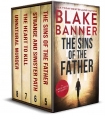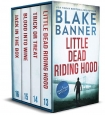Angelina Bonaparte Mysteries Box Set Nanci Rathbun (i love reading books txt) 📖

- Author: Nanci Rathbun
Book online «Angelina Bonaparte Mysteries Box Set Nanci Rathbun (i love reading books txt) 📖». Author Nanci Rathbun
“Um, no. I guess it’s really one-three-nine-one-eight. But my parents made me memorize it the other way. If you count the letters in the alphabet, it’s the English spelling of mir—Serbian for peace.”
“I’ll keep my eyes open for anything with that combination of numbers,” I said, entering them in my tablet, along with the addresses of the store and the home. “Maybe it’s for an account somewhere. Susan will know.”
I kissed Bobbie good-bye on the cheek, not one of those kitschy air kisses, but real lips to skin. It seemed silly to shake hands with Adriana after that, but a kiss felt over the top, so I hugged her.
“Thanks for everything, Angie,” she leaned down to whisper in my ear. “I don’t know what I would do without your help.”
“Try not to worry. I’ll be in touch tomorrow. Oh, and don’t make any personal calls, okay?”
Her face fell. “Can’t I call Jennifer? She’s the friend I was out with, the night it happened. She’ll be worried about me.”
“It’s best if no one has your location or phone number for now. Why don’t you give me Jennifer’s number and I’ll let her know you’re okay and will be in touch.” I noted the information and headed downstairs to the Miata. The grounds were quiet and there was no sign of activity. It felt safe. Still, I took a circuitous route to the south side location of Johnson’s Neighborhood Hardware Store.
Chapter 6
This is unexpected…like squirt from aggressive grapefruit.
—Earl Derr Biggers
The store was small, situated in what was once a predominately Polish community. The neighborhood opened its arms to former Soviet Union and eastern European immigrants, but was quietly holding out against an influx of Latinos from nearby areas. Serb Hall, a Milwaukee institution for its Friday night fish fries, was only blocks away.
I drove past Johnson’s Hardware. Like the other storefronts on the block, it was narrow and mildly shabby. I entered the alley that backed the store, parking the Miata in the loading zone. It was six o’clock on a Thursday—I suddenly remembered my promise to let Papa and Aunt Terry know tomorrow if Wukowski would be there for Thanksgiving—and the alley was empty of life. Not even a stray cat. It felt a bit creepy, but I didn’t sense danger. Still, I removed my gun from my briefcase holster, checked the safety, tucked the weapon into the flap of my shoulder bag, and exited and locked the car.
The building was an older brick structure, obviously intended to house the storeowner and family above the business. In the early evening darkness of a Milwaukee November, I saw no lights above or in the store itself. The upper windows sported cheap pull-down roller shades, some with rips and others hanging at crazy angles.
There was no crime scene tape up, the murders having occurred a week ago. I pulled on latex gloves and prepared to go in the back door. After checking the small walkways on either side of the building, which were surprisingly free of debris, I inserted the bigger of two house keys into the bottom lock. It fit. It took two tries for the deadbolt, but I was inside and disarming the alarm within seconds. Leaving the door unlocked, in case I had to make a speedy exit, I pulled my 9mm and disabled the safety. This was a murder site, after all. Better to be prepared.
The bathroom was clean but sparse, with a toilet and sink, and a towel bar holding a threadbare utility cloth. Across the short entry hall was another door. I eased it open and reached in to flip the light switch, sweeping the room with my eyes and my pistol. It was used for storage, with utility shelves all around, mostly filled with stock and unopened boxes. A scarred wooden table sat square in the center, with packing materials on top and flattened boxes underneath. The floor had a layer of undisturbed dust. The police hadn’t entered the room. I turned the light off and re-closed the door, deciding to preserve the room for later.
What hit me first when I entered the store area itself were the bloodstains on the wood plank floor and the chalk outlines of two bodies. The deaths occurred a week ago. Why hadn’t the attorney arranged for the store to be cleaned?
The reality of the deaths of Adriana’s parents almost overwhelmed me. I hardly remembered my own mother, who died when I was barely one, from complications of the flu. But I loved my papa dearly, despite his bossy interference in my life, and I couldn’t bear to think of him lying on this floor, cold and dead.
Careful not to disturb evidence, I edged along one wall, noting that the area of blood on the floor was only about the size of a bath mat. Of course, I couldn’t tell how much had soaked into the wooden planks.
The Johnsons’ blood and brain matter splattered the front wall of the checkout counter. I felt sure I was seeing the results of another execution. I took several slow breaths.
The store seemed typical for a mom-and-pop operation. Shelving around the perimeter, except for the counter area. Paint and painting supplies. Some wallpaper books, but no stock. A large cabinet with many small, neatly labeled plastic drawers, filled with screws and nails. A display of tools: hammers, pliers, screwdrivers, wrenches, even a few handsaws and drills. That’s when it struck me: only manual tools were on display.
I quickly reviewed the store contents again. It seemed at first glance as if the store was stocked appropriately, but a second examination revealed that there were no big moneymakers for sale. Where were the electric tools, the carpet shampooers and floor buffers, the high-margin items that contribute to profit?
The checkout counter was a testament to late nineteenth century storekeeping. An ancient manual cash register, its empty cash drawer hanging open. A pad of receipt forms. A metal spindle for holding completed carbons. A small calculator.





Comments (0)